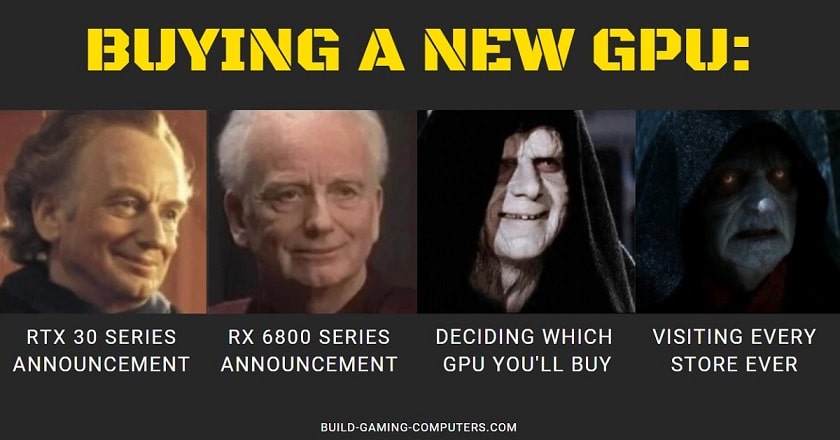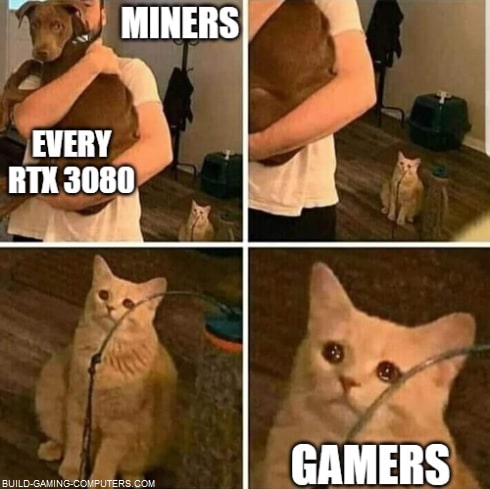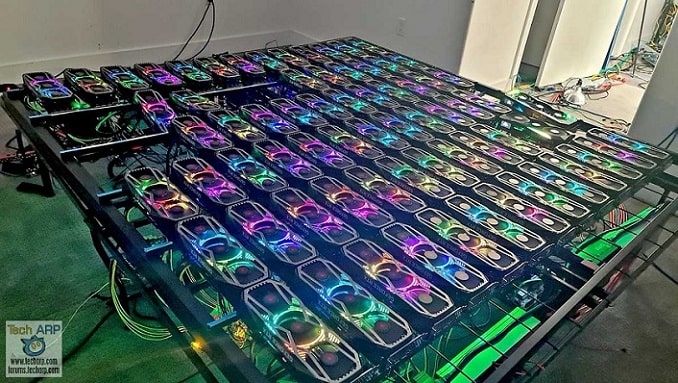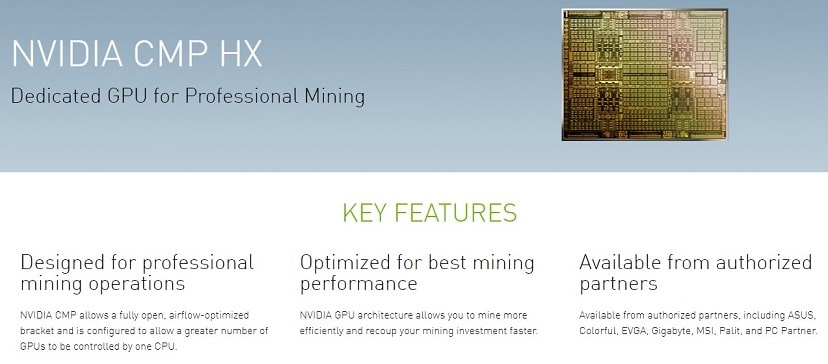Home > Best Gaming GPUs > GPU Prices
GPU Market Still a Mess in March
GPU Drought Explained: 3 Reasons Why Graphics Card Prices Are So Crazy High

Published: March 3, 2021
The first couple months of the year have not been a good time to build or upgrade a PC due to the ongoing GPU price and availability madness. But will things get better soon? Or is the GPU market doomed for the foreseeable future? Based on where we are right now in early March, there's some good news but also plenty of bad news. Let's discuss, including just why graphics card prices are so high right now for anyone who may be just getting into hardware for the first time (or getting back into it after a long time away) and are puzzled by the historically high prices and shockingly low availability plaguing the graphics card market these past few months.
For PC enthusiasts who follow the happenings in hardware consistently (whether just casually or more intensely), the sorry state of the GPU market at present makes sense; we saw a very similar situation unfold a few years back following the cryptocurrency boom back then. But unfortunately for gamers and PC builders, this time around, thanks to even more bad-luck ducks lined up in a row than last time, this GPU drought is objectively significantly worse, making the 2017/2018 crisis a joke in comparison. If you're out of the loop, these are the 3 main reasons why GPU prices are so high right now.
1. All-Time High Demand for GPUs (& Tech/Gaming in General)
Last year, the anticipation building up to the latest NVidia RTX 30 series launch was substantial, as some were predicting these new graphics cards to be a significant leap forward. Once the cards were officially announced for the first time in Q3 2020, that initial hype turned to huge, tangible excitement as NVidia showed their hand.
The RTX 30 series reveal indicated that this new generation would indeed be a nice step forward - and at a more attractive price than the previous 20 series - with the standout face-melting headline from the announcement being their claim of the new RTX 3070 being "faster than a 2080 Ti" with an MSRP starting at $499 US (the 2080 Ti initially launched at $1199 US).
To say these initial prices would age badly is an understatement.
Post-launch is when things started to go downhill for GPU land, with the hype surrounding the exciting new gen quickly turning to frustration for many as each and every single card in the new lineup sold out at a lightning pace due to demand overwhelmingly exceeding supply. It only got worse from there, with the same thing happening to every launch of AMD's new competing RX 6000 series of cards too - hardly anyone being able to get a hold of one, and cards selling out in the blink of an eye (and rinse and repeat whenever a little more stock popped up; gobbled up in minutes or even seconds).
This crazy demand for new graphics cards is not solely down to the attractive (but now fictional) value proposition of this new generation of GPUs, but also largely because of the general increased demand for all-things tech and gaming as more and more people work and play from home in this day and age.
These two factors - soaring demand for tech/gaming and excitement for the fast new GPUs - collided to create colossal demand that manufacturers never stood a chance to fill. And of course, when you throw in supply chain issues caused by the world health crisis (not to mention crypto which I'll get to) you can imagine the strain on the system.
2. GPU Supply Issues Partly Caused By Mass Human Malware
High demand on its own is great - if there is normal supply that is. If demand is up real high through the roof and supply is down real low (through the floor?) the world isn't going to add up. For obvious reasons, the hardware industry encountered manufacturing and supply chain issues last year, as did many other industries on Earth.
Scalpers made the sorry state of supply vs demand even worse, seizing the opportunity to scoop up any and all GPUs to flip them for absurd prices on Ebay and used markets (buying a used GPU is just as much a shock to the wallet right now as buying new). The most sophisticated opportunists used bots to sneakily purchase cards faster than mere mortals like you and I could ever do, and NVidia even publicly announced intentions to bolster their online store processes to tackle the issue head-on (near launch many were trying to purchase Founder's Edition cards directly from the NVidia site).
But all that said about the issues of demand, supply, scalpers, bots, and other factors I haven't even touched on like price tariffs implemented in January 2021 (that raised the actual base MSRP of graphics cards as explained here) - and we still haven't got to the crux of the matter at hand right now. The biggest elephants in the room, and arguably the biggest reason why the GPU drought is still in full effect as I write this in March 2021 (with no end in sight), is of course the PC gamer's arch nemesis. Cryptocurrency miners are back and in more numbers than ever before, and they're unlikely to be going anywhere anytime soon as the digital currency market (ie Bitcoin) continues with upward momentum.
 All Your GPUs Belong to Us Now
All Your GPUs Belong to Us Now3. Another Cryptocurrency Mining Boom
The icing on the catastrophic cake that was the Q4 2020 GPU market was the fact that cryptocurrency mining started booming again at literally the worst possible time for gamers and power users. Exactly like what happened in late 2017 when miners completely overpowered gamers in terms of desire and financial means to grab hardware, in recent months professional and casual cryptocurrency miners have flooded to gaming GPUs in droves yet again due to a significant upward trajectory in price of Bitcoin and other cryptocurrencies like Ethereum in recent months.
When these crypto price spikes happen, the profitability of running mining rigs (ie racks/farms of multiple GPUs that work day and night to "mine" cryptocurrencies like Ethereum) increases to the point where miners eat up literally each and every single half-decent graphics card within a million mile radius with more gusto than even the most hardcore of gamer wanting a better graphics experience. In other words, miners are willing to fork out almost any amount of money over MSRP to get their hands on as many cards as possible to increase mining profits, and they do this with a backup plan of selling off the cards on the used market to gamers should the crypto market crash.
 Miners: 1000, Gamers: 0 (Image: A GPU Farm Shown On Techarp)
Miners: 1000, Gamers: 0 (Image: A GPU Farm Shown On Techarp)When this same situation occurred back in late 2017 when buying GPUs was also a nightmare, it took until around mid 2018 for the market to start normalizing again if I recall correctly, as that's when cryptocurrency prices started crashing back down to Earth (and with that, mining profitability). Whether history repeats itself in 2021 will be interesting to see, but if it doesn't and crypto does not crash, the whole miners vs gamers issue will be here to stay for at least the foreseeable future.
Now to the potentially good news of late; NVidia recently made a couple announcements in February that could slowly help the market get back on its feet, but there is also every chance that these 2 slight twists in the plot turn out to have little to no effect in the macro. Let me explain.
NVidia's Latest Announcements to Help Gamers (Maybe)
As strange as it is, since the fate of the gaming GPU market is so heavily tied to what's going on in cryptocurrency (specifically the mining aspect), the most relevant question of all right now is when (or if) the intense demand for GPUs from miners will ease a little. The truth is, your guess is as good as anybody's - nobody knows what's going to happen in such a volatile industry as crypto, but right now there's no real sign of a slow down anytime soon.
One piece of positive news for gamers would be NVidia recently announcing the restrictions to mining on the just released RTX 3060 (non Ti), but how much of a difference this makes in practice will remain to be seen since NVidia only restricted mining of Ethereum and there are other cryptocurrencies that can be mined for profit using a GPU (ie Ravencoin just to name one). Not to mention the fact that when big money is involved, where there's a will there's a way and shrewd miners may find a way around NVidia's software-side restriction.
"With the launch of GeForce RTX 3060 on Feb. 25, we’re taking an important step to help ensure GeForce GPUs end up in the hands of gamers. Halving Hash Rate RTX 3060 software drivers are designed to detect specific attributes of the Ethereum cryptocurrency mining algorithm, and limit the hash rate, or cryptocurrency mining efficiency, by around 50 percent" - NVidia
NVidia's throttling of the RTX 3060 could definitely work well to wade off miners though, potentially making this important mainstream-tier card an easier purchase compared to the near-impossible gets that are the RTX 3060 Ti, 3070, 3080, 6800, and 6800XT (though even previous-gen cards like the 5700 and 2060 series are all being gobbled up left right and center). The 3090 and 6900XT seem a fraction easier to get a hold of, but aren't that desirable anyway from a price vs performance standpoint for gamers as you're forking out a kidney for only minimal gains over the RTX 3080 and RX 6800 XT.
The other piece of good news worth pointing out if you haven't already heard is NVidia announcing the upcoming release of a dedicated mining GPU, which could also theoretically help free up availability of gaming cards. The key word here is theoretically, so we'll have to wait and see what impact these new graphics chips have on the market.
"To address the specific needs of Ethereum mining, we’re announcing the NVIDIA CMP, or, Cryptocurrency Mining Processor, product line for professional mining. CMP products — which don’t do graphics — are sold through authorized partners and optimized for the best mining performance and efficiency. They don’t meet the specifications required of a GeForce GPU and, thus, don’t impact the availability of GeForce GPUs to gamers." - NVidia
 Dedicated Mining GPUs Are Coming in Q1/Q2 (Source: NVidia)
Dedicated Mining GPUs Are Coming in Q1/Q2 (Source: NVidia)When Will GPU Prices Go Down?
What am I, Nostradamus? If you want my 2 galactic credits on the matter though, here's what I got. As was the catalyst of the horrendous late 2017 and early 2018 GPU market turning around for the better, a crash in cryptocurrency prices (specifically Bitcoin which is the thermometer of the space as a whole) would have the biggest net positive effect on the GPU market in favor of gamers and general consumers, and that is entirely possible to happen at literally any point in time.
By the same token, it might not happen, or crypto prices may stabilize around where they are now (hovering near all-time highs at the time of writing), and mining profitability may continue its hot streak for quite some time. Not that I'm rooting for a crypto crash mind you - as a believer in the space long-term (eg NFTs look set to play a role in future gaming and VR worlds), I would much rather see some respite for the PC market via an alternate route such as increased supply or NVidia's aforementioned attempts working out well.
All things considered, my best guess is the GPU drought of doom will continue through Q2 - at least. Keep in mind it's not impossible to buy a GPU, but you'll be needing some solid timing and a willingness to pay much higher than MSRP. Therefore, unless you're super keen to build or upgrade a system now, the best bet for most people would be to hold out for the GPU market to stabilize a little (hopefully come Q3 though there are no guarantees unfortunately).
Depending on your region, buying a prebuilt gaming PC can be an easier way to get a hold of one of the latest high-end cards like the RTX 3080, but you're still going to be paying more than normal. If you are still set on hunting down a GPU for your own build, check out this helpful Reddit thread if you want to increase your chances out there (applies to all GPUs, not just the mighty 3080) and good luck 'cause you'll be needing it my friend:
How To Buy A RTX 3080 (USA Edition)
Value CPUs of the Month (Feb 2025)
- Intel Core i5 12400F (6 Core)
- AMD Ryzen 5 7600X (6 Core)
- AMD Ryzen 7 7800X3D (8 Core)
Trusted VPN
VPN software can be important in this day and age, especially if you do lots of online banking and/or use public WiFi whilst travelling. Having a VPN adds an extra layer of security to your PC or laptop to help protect your details such as financials, banking activity, etc. There are also benefits to using VPNs for gaming.
Because they're so popular these days, there are countless VPN providers, and it can be confusing to pick one. If you want my 2 cents, after a lot of research I decided on NordVPN 'cause it's one of the fastest, most reliable VPNs for both gaming and general use, with a lot of credible reviews out there backing that up. They also quite often run very solid deals.
Popular Articles
Value GPUs of the Month (Feb 2025)
- Gigabyte Radeon RX 7600 XT Gaming OC (16GB)
- Gigabyte Radeon RX 7800 XT Gaming OC (16GB)
- ASUS GeForce RTX 3060 Dual V2 OC (12GB)
Search the Site
About Me (2025 Update)
I'm an indie game developer currently developing my first public release, an immersive VR spy shooter with sci-fi themes set to release on Steam, partly inspired by the likes of Perfect Dark, MGS2, HL2, Splinter Cell, and Deus Ex. Researching, writing, and updating this site helps a little with self-funding the game, as I earn a few dollars here and there from Amazon's affiliate program (if you click an Amazon link on this site and buy something, I get a tiny cut of the total sale, at no extra cost to you).
I hope the site helps save you money or frustration when building a new PC, and makes your PC building journey easier and more fun. If you want to support the countless hours that's gone into creating and maintaining the site, besides using my Amazon links if purchasing something, sharing an article on socials or Reddit does help out and is much appreciated. I also accept coffee.

